Case Study: Applying Case Management Principles to Leticia and Dashon
VerifiedAdded on 2022/10/02
|9
|2023
|376
Case Study
AI Summary
This case management report details the case of Leticia, a mother recovering from drug addiction, and her son Dashon, highlighting the challenges they face due to Leticia's past and their current environment. The report analyzes the case, providing facts about Leticia's history, her concerns for her son's future, and her lack of financial support. It then outlines the process of effective case management, including assessment, planning, implementation, and monitoring, and identifies organizations that can provide support services. The report also addresses ethical issues and decisions involved in the case, emphasizing the importance of dignity, respect, confidentiality, and the pursuit of social justice. The case study showcases the application of case management principles to support vulnerable families and ensure the well-being of children.
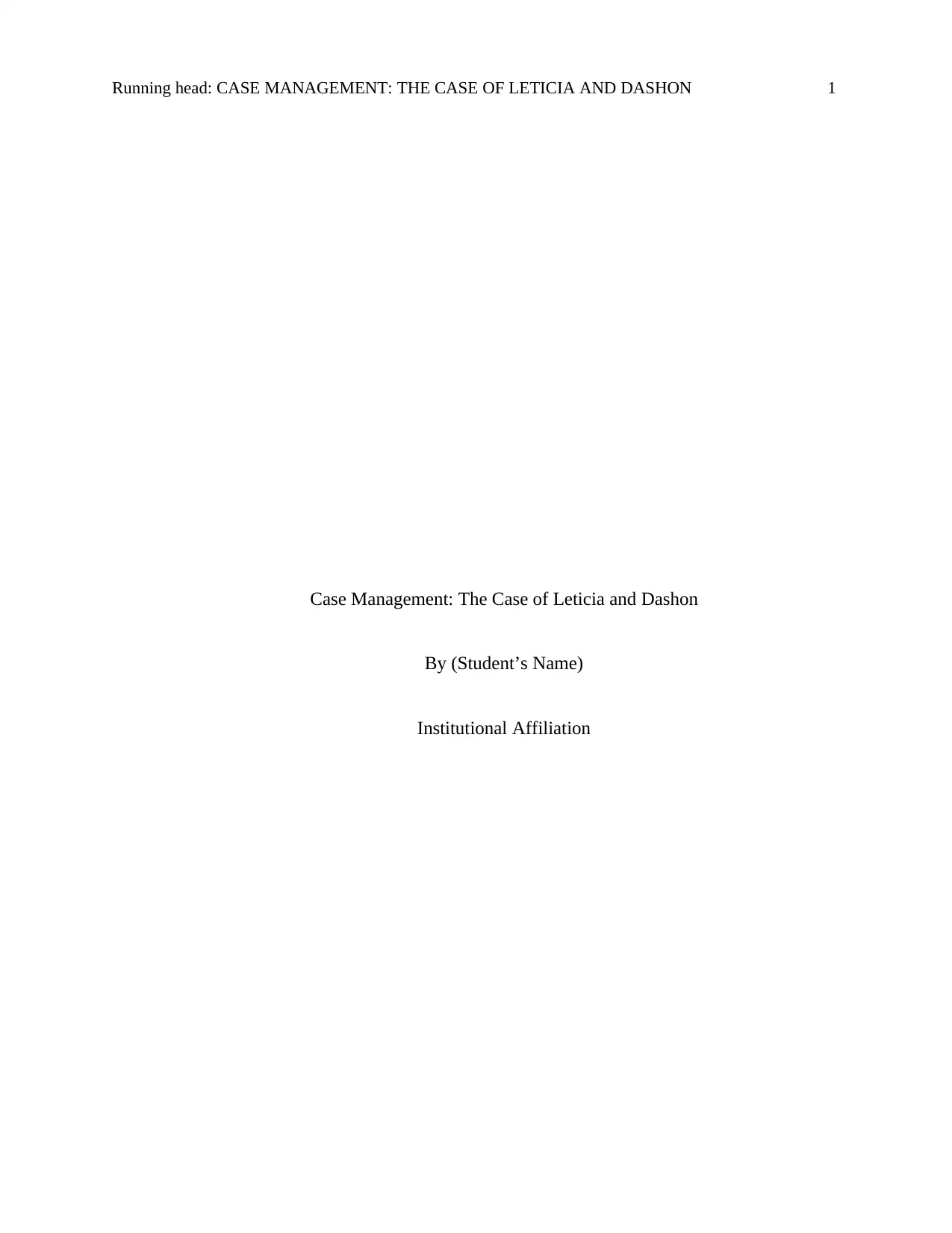
Running head: CASE MANAGEMENT: THE CASE OF LETICIA AND DASHON 1
Case Management: The Case of Leticia and Dashon
By (Student’s Name)
Institutional Affiliation
Case Management: The Case of Leticia and Dashon
By (Student’s Name)
Institutional Affiliation
Paraphrase This Document
Need a fresh take? Get an instant paraphrase of this document with our AI Paraphraser
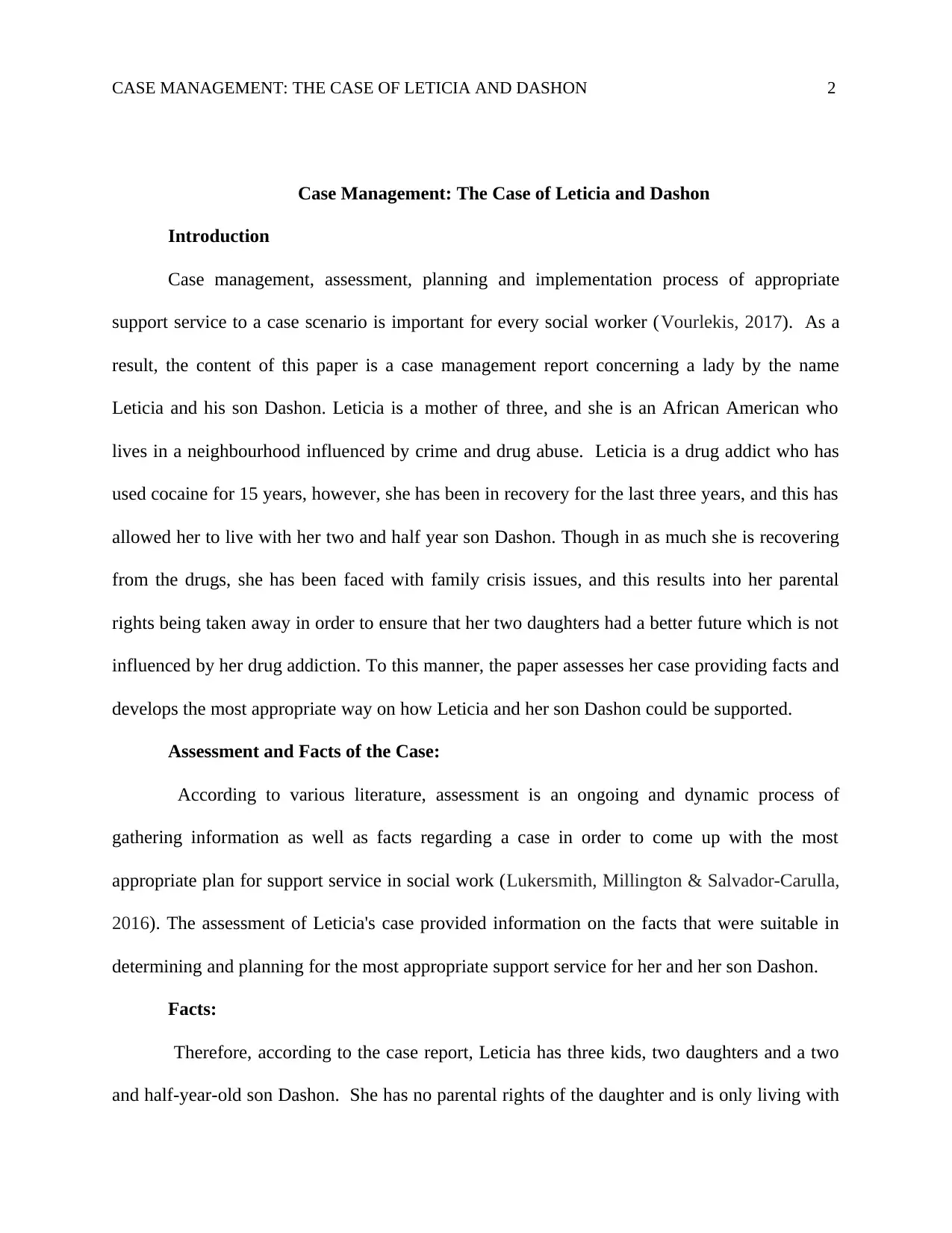
CASE MANAGEMENT: THE CASE OF LETICIA AND DASHON 2
Case Management: The Case of Leticia and Dashon
Introduction
Case management, assessment, planning and implementation process of appropriate
support service to a case scenario is important for every social worker (Vourlekis, 2017). As a
result, the content of this paper is a case management report concerning a lady by the name
Leticia and his son Dashon. Leticia is a mother of three, and she is an African American who
lives in a neighbourhood influenced by crime and drug abuse. Leticia is a drug addict who has
used cocaine for 15 years, however, she has been in recovery for the last three years, and this has
allowed her to live with her two and half year son Dashon. Though in as much she is recovering
from the drugs, she has been faced with family crisis issues, and this results into her parental
rights being taken away in order to ensure that her two daughters had a better future which is not
influenced by her drug addiction. To this manner, the paper assesses her case providing facts and
develops the most appropriate way on how Leticia and her son Dashon could be supported.
Assessment and Facts of the Case:
According to various literature, assessment is an ongoing and dynamic process of
gathering information as well as facts regarding a case in order to come up with the most
appropriate plan for support service in social work (Lukersmith, Millington & Salvador-Carulla,
2016). The assessment of Leticia's case provided information on the facts that were suitable in
determining and planning for the most appropriate support service for her and her son Dashon.
Facts:
Therefore, according to the case report, Leticia has three kids, two daughters and a two
and half-year-old son Dashon. She has no parental rights of the daughter and is only living with
Case Management: The Case of Leticia and Dashon
Introduction
Case management, assessment, planning and implementation process of appropriate
support service to a case scenario is important for every social worker (Vourlekis, 2017). As a
result, the content of this paper is a case management report concerning a lady by the name
Leticia and his son Dashon. Leticia is a mother of three, and she is an African American who
lives in a neighbourhood influenced by crime and drug abuse. Leticia is a drug addict who has
used cocaine for 15 years, however, she has been in recovery for the last three years, and this has
allowed her to live with her two and half year son Dashon. Though in as much she is recovering
from the drugs, she has been faced with family crisis issues, and this results into her parental
rights being taken away in order to ensure that her two daughters had a better future which is not
influenced by her drug addiction. To this manner, the paper assesses her case providing facts and
develops the most appropriate way on how Leticia and her son Dashon could be supported.
Assessment and Facts of the Case:
According to various literature, assessment is an ongoing and dynamic process of
gathering information as well as facts regarding a case in order to come up with the most
appropriate plan for support service in social work (Lukersmith, Millington & Salvador-Carulla,
2016). The assessment of Leticia's case provided information on the facts that were suitable in
determining and planning for the most appropriate support service for her and her son Dashon.
Facts:
Therefore, according to the case report, Leticia has three kids, two daughters and a two
and half-year-old son Dashon. She has no parental rights of the daughter and is only living with
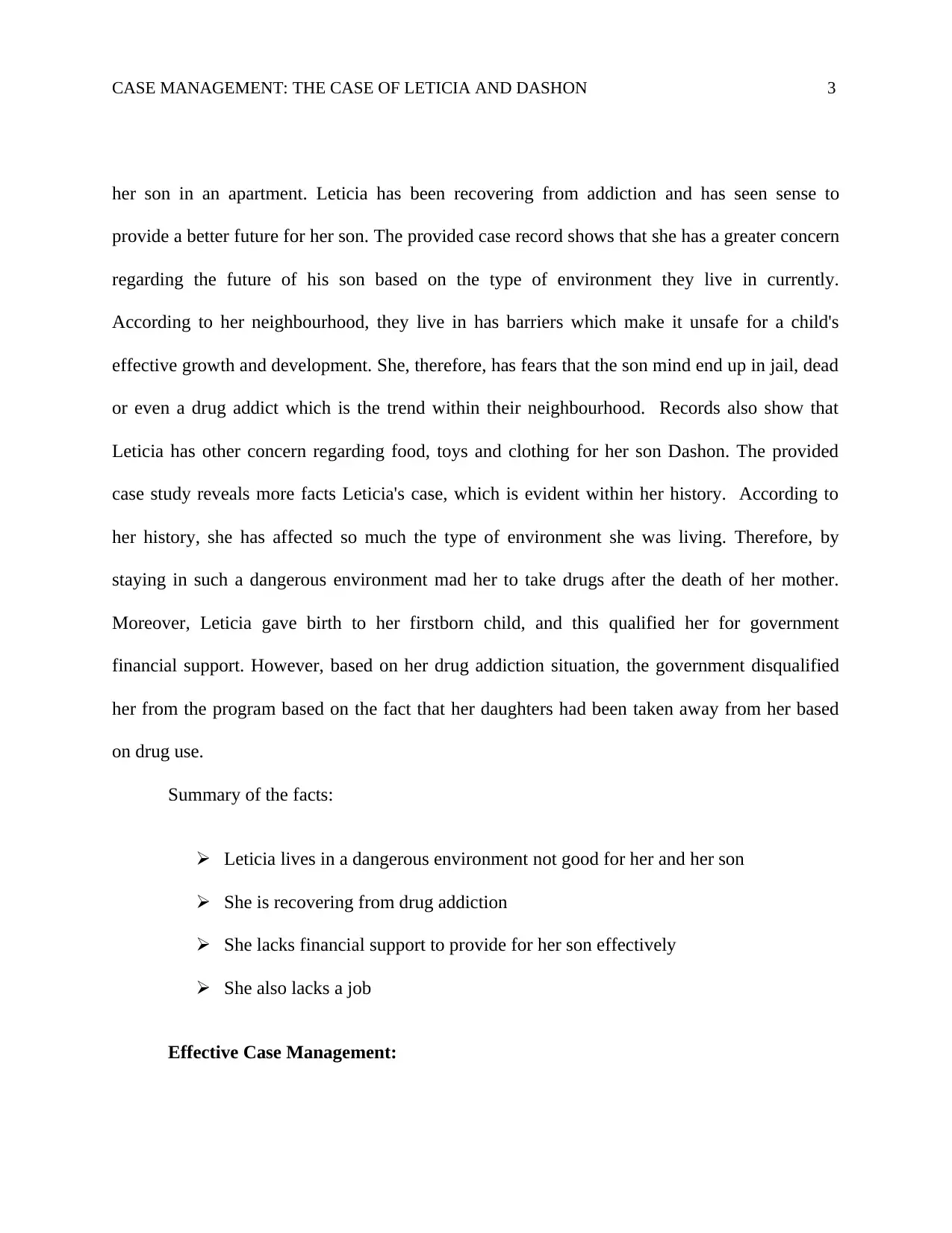
CASE MANAGEMENT: THE CASE OF LETICIA AND DASHON 3
her son in an apartment. Leticia has been recovering from addiction and has seen sense to
provide a better future for her son. The provided case record shows that she has a greater concern
regarding the future of his son based on the type of environment they live in currently.
According to her neighbourhood, they live in has barriers which make it unsafe for a child's
effective growth and development. She, therefore, has fears that the son mind end up in jail, dead
or even a drug addict which is the trend within their neighbourhood. Records also show that
Leticia has other concern regarding food, toys and clothing for her son Dashon. The provided
case study reveals more facts Leticia's case, which is evident within her history. According to
her history, she has affected so much the type of environment she was living. Therefore, by
staying in such a dangerous environment mad her to take drugs after the death of her mother.
Moreover, Leticia gave birth to her firstborn child, and this qualified her for government
financial support. However, based on her drug addiction situation, the government disqualified
her from the program based on the fact that her daughters had been taken away from her based
on drug use.
Summary of the facts:
Leticia lives in a dangerous environment not good for her and her son
She is recovering from drug addiction
She lacks financial support to provide for her son effectively
She also lacks a job
Effective Case Management:
her son in an apartment. Leticia has been recovering from addiction and has seen sense to
provide a better future for her son. The provided case record shows that she has a greater concern
regarding the future of his son based on the type of environment they live in currently.
According to her neighbourhood, they live in has barriers which make it unsafe for a child's
effective growth and development. She, therefore, has fears that the son mind end up in jail, dead
or even a drug addict which is the trend within their neighbourhood. Records also show that
Leticia has other concern regarding food, toys and clothing for her son Dashon. The provided
case study reveals more facts Leticia's case, which is evident within her history. According to
her history, she has affected so much the type of environment she was living. Therefore, by
staying in such a dangerous environment mad her to take drugs after the death of her mother.
Moreover, Leticia gave birth to her firstborn child, and this qualified her for government
financial support. However, based on her drug addiction situation, the government disqualified
her from the program based on the fact that her daughters had been taken away from her based
on drug use.
Summary of the facts:
Leticia lives in a dangerous environment not good for her and her son
She is recovering from drug addiction
She lacks financial support to provide for her son effectively
She also lacks a job
Effective Case Management:
⊘ This is a preview!⊘
Do you want full access?
Subscribe today to unlock all pages.

Trusted by 1+ million students worldwide
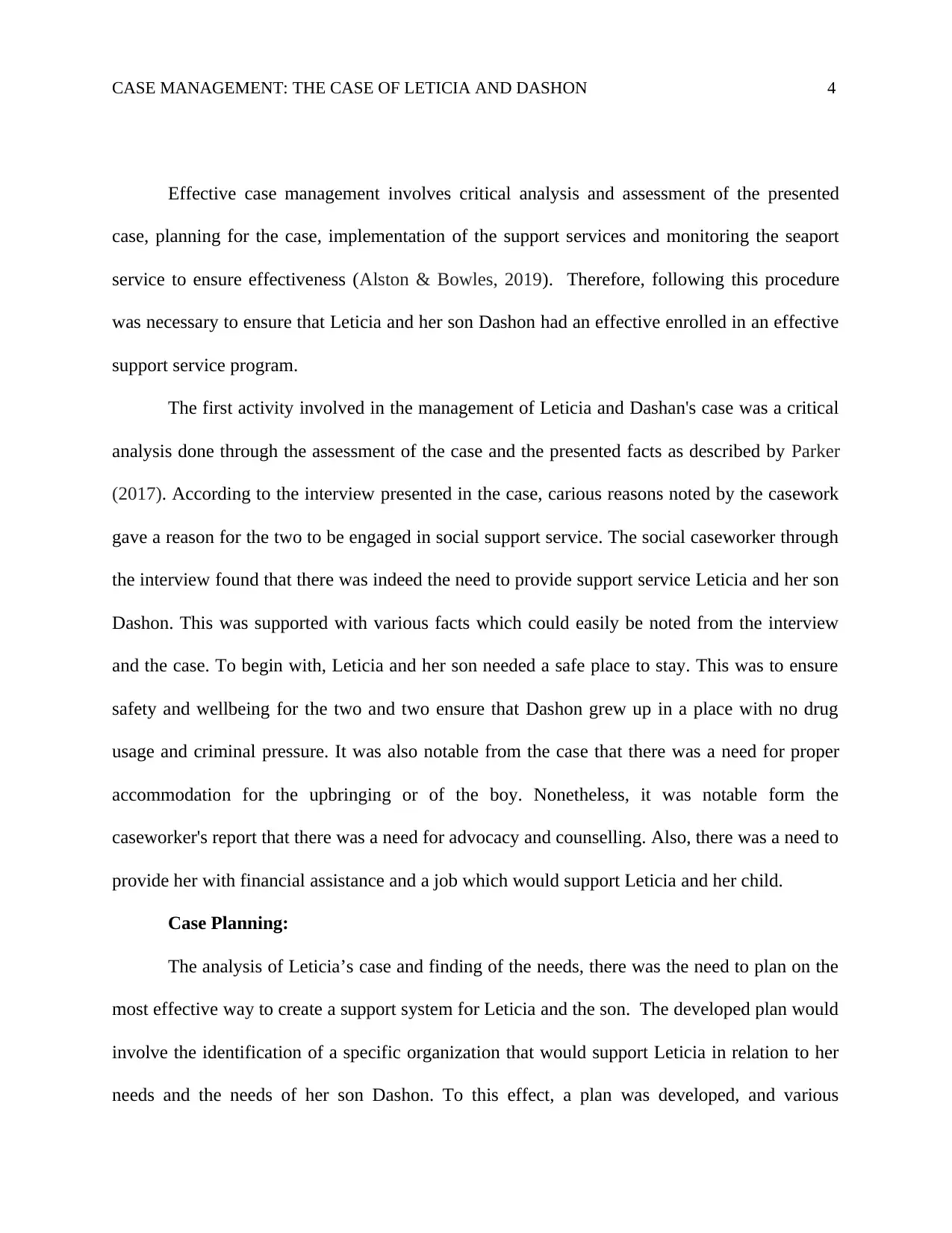
CASE MANAGEMENT: THE CASE OF LETICIA AND DASHON 4
Effective case management involves critical analysis and assessment of the presented
case, planning for the case, implementation of the support services and monitoring the seaport
service to ensure effectiveness (Alston & Bowles, 2019). Therefore, following this procedure
was necessary to ensure that Leticia and her son Dashon had an effective enrolled in an effective
support service program.
The first activity involved in the management of Leticia and Dashan's case was a critical
analysis done through the assessment of the case and the presented facts as described by Parker
(2017). According to the interview presented in the case, carious reasons noted by the casework
gave a reason for the two to be engaged in social support service. The social caseworker through
the interview found that there was indeed the need to provide support service Leticia and her son
Dashon. This was supported with various facts which could easily be noted from the interview
and the case. To begin with, Leticia and her son needed a safe place to stay. This was to ensure
safety and wellbeing for the two and two ensure that Dashon grew up in a place with no drug
usage and criminal pressure. It was also notable from the case that there was a need for proper
accommodation for the upbringing or of the boy. Nonetheless, it was notable form the
caseworker's report that there was a need for advocacy and counselling. Also, there was a need to
provide her with financial assistance and a job which would support Leticia and her child.
Case Planning:
The analysis of Leticia’s case and finding of the needs, there was the need to plan on the
most effective way to create a support system for Leticia and the son. The developed plan would
involve the identification of a specific organization that would support Leticia in relation to her
needs and the needs of her son Dashon. To this effect, a plan was developed, and various
Effective case management involves critical analysis and assessment of the presented
case, planning for the case, implementation of the support services and monitoring the seaport
service to ensure effectiveness (Alston & Bowles, 2019). Therefore, following this procedure
was necessary to ensure that Leticia and her son Dashon had an effective enrolled in an effective
support service program.
The first activity involved in the management of Leticia and Dashan's case was a critical
analysis done through the assessment of the case and the presented facts as described by Parker
(2017). According to the interview presented in the case, carious reasons noted by the casework
gave a reason for the two to be engaged in social support service. The social caseworker through
the interview found that there was indeed the need to provide support service Leticia and her son
Dashon. This was supported with various facts which could easily be noted from the interview
and the case. To begin with, Leticia and her son needed a safe place to stay. This was to ensure
safety and wellbeing for the two and two ensure that Dashon grew up in a place with no drug
usage and criminal pressure. It was also notable from the case that there was a need for proper
accommodation for the upbringing or of the boy. Nonetheless, it was notable form the
caseworker's report that there was a need for advocacy and counselling. Also, there was a need to
provide her with financial assistance and a job which would support Leticia and her child.
Case Planning:
The analysis of Leticia’s case and finding of the needs, there was the need to plan on the
most effective way to create a support system for Leticia and the son. The developed plan would
involve the identification of a specific organization that would support Leticia in relation to her
needs and the needs of her son Dashon. To this effect, a plan was developed, and various
Paraphrase This Document
Need a fresh take? Get an instant paraphrase of this document with our AI Paraphraser
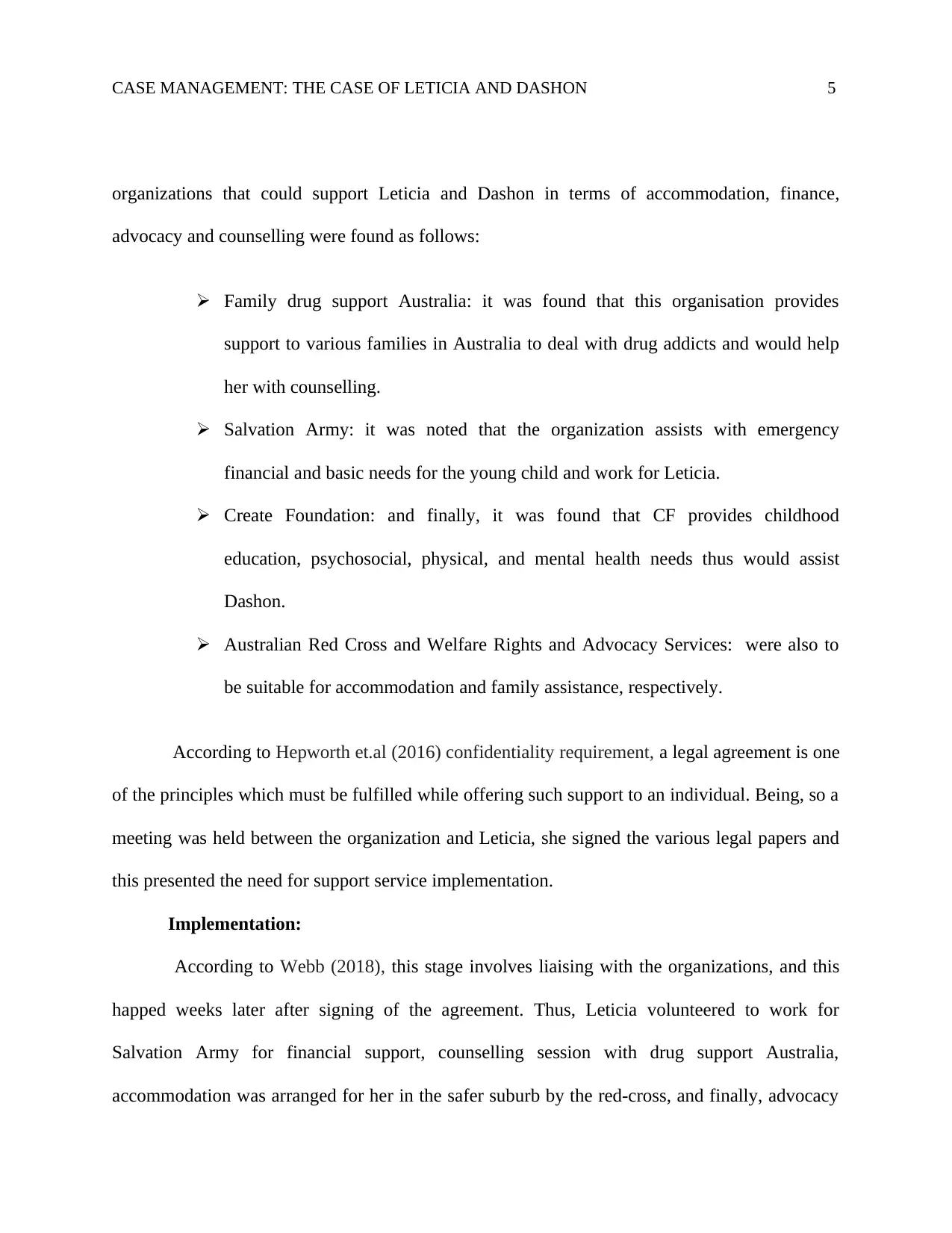
CASE MANAGEMENT: THE CASE OF LETICIA AND DASHON 5
organizations that could support Leticia and Dashon in terms of accommodation, finance,
advocacy and counselling were found as follows:
Family drug support Australia: it was found that this organisation provides
support to various families in Australia to deal with drug addicts and would help
her with counselling.
Salvation Army: it was noted that the organization assists with emergency
financial and basic needs for the young child and work for Leticia.
Create Foundation: and finally, it was found that CF provides childhood
education, psychosocial, physical, and mental health needs thus would assist
Dashon.
Australian Red Cross and Welfare Rights and Advocacy Services: were also to
be suitable for accommodation and family assistance, respectively.
According to Hepworth et.al (2016) confidentiality requirement, a legal agreement is one
of the principles which must be fulfilled while offering such support to an individual. Being, so a
meeting was held between the organization and Leticia, she signed the various legal papers and
this presented the need for support service implementation.
Implementation:
According to Webb (2018), this stage involves liaising with the organizations, and this
happed weeks later after signing of the agreement. Thus, Leticia volunteered to work for
Salvation Army for financial support, counselling session with drug support Australia,
accommodation was arranged for her in the safer suburb by the red-cross, and finally, advocacy
organizations that could support Leticia and Dashon in terms of accommodation, finance,
advocacy and counselling were found as follows:
Family drug support Australia: it was found that this organisation provides
support to various families in Australia to deal with drug addicts and would help
her with counselling.
Salvation Army: it was noted that the organization assists with emergency
financial and basic needs for the young child and work for Leticia.
Create Foundation: and finally, it was found that CF provides childhood
education, psychosocial, physical, and mental health needs thus would assist
Dashon.
Australian Red Cross and Welfare Rights and Advocacy Services: were also to
be suitable for accommodation and family assistance, respectively.
According to Hepworth et.al (2016) confidentiality requirement, a legal agreement is one
of the principles which must be fulfilled while offering such support to an individual. Being, so a
meeting was held between the organization and Leticia, she signed the various legal papers and
this presented the need for support service implementation.
Implementation:
According to Webb (2018), this stage involves liaising with the organizations, and this
happed weeks later after signing of the agreement. Thus, Leticia volunteered to work for
Salvation Army for financial support, counselling session with drug support Australia,
accommodation was arranged for her in the safer suburb by the red-cross, and finally, advocacy
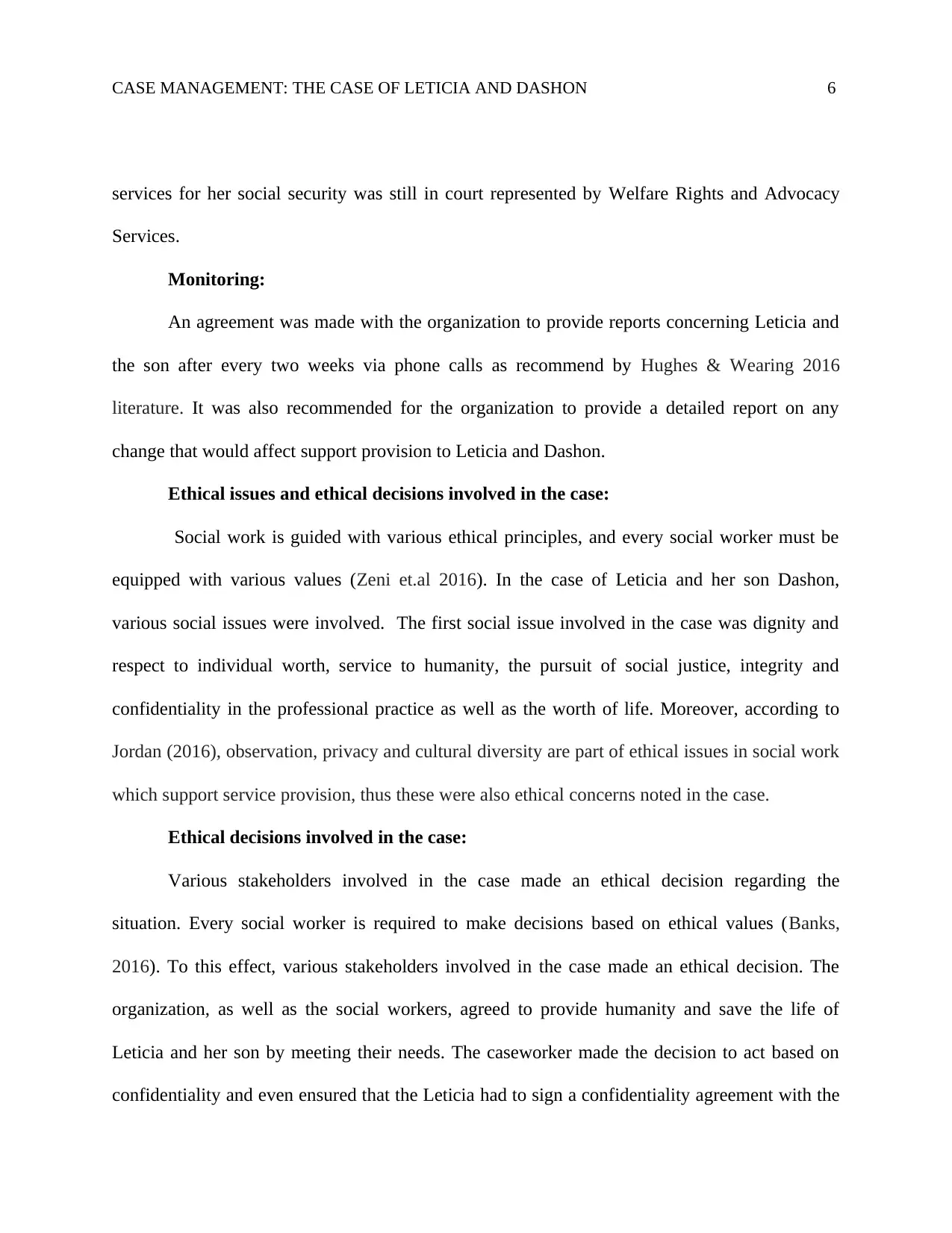
CASE MANAGEMENT: THE CASE OF LETICIA AND DASHON 6
services for her social security was still in court represented by Welfare Rights and Advocacy
Services.
Monitoring:
An agreement was made with the organization to provide reports concerning Leticia and
the son after every two weeks via phone calls as recommend by Hughes & Wearing 2016
literature. It was also recommended for the organization to provide a detailed report on any
change that would affect support provision to Leticia and Dashon.
Ethical issues and ethical decisions involved in the case:
Social work is guided with various ethical principles, and every social worker must be
equipped with various values (Zeni et.al 2016). In the case of Leticia and her son Dashon,
various social issues were involved. The first social issue involved in the case was dignity and
respect to individual worth, service to humanity, the pursuit of social justice, integrity and
confidentiality in the professional practice as well as the worth of life. Moreover, according to
Jordan (2016), observation, privacy and cultural diversity are part of ethical issues in social work
which support service provision, thus these were also ethical concerns noted in the case.
Ethical decisions involved in the case:
Various stakeholders involved in the case made an ethical decision regarding the
situation. Every social worker is required to make decisions based on ethical values (Banks,
2016). To this effect, various stakeholders involved in the case made an ethical decision. The
organization, as well as the social workers, agreed to provide humanity and save the life of
Leticia and her son by meeting their needs. The caseworker made the decision to act based on
confidentiality and even ensured that the Leticia had to sign a confidentiality agreement with the
services for her social security was still in court represented by Welfare Rights and Advocacy
Services.
Monitoring:
An agreement was made with the organization to provide reports concerning Leticia and
the son after every two weeks via phone calls as recommend by Hughes & Wearing 2016
literature. It was also recommended for the organization to provide a detailed report on any
change that would affect support provision to Leticia and Dashon.
Ethical issues and ethical decisions involved in the case:
Social work is guided with various ethical principles, and every social worker must be
equipped with various values (Zeni et.al 2016). In the case of Leticia and her son Dashon,
various social issues were involved. The first social issue involved in the case was dignity and
respect to individual worth, service to humanity, the pursuit of social justice, integrity and
confidentiality in the professional practice as well as the worth of life. Moreover, according to
Jordan (2016), observation, privacy and cultural diversity are part of ethical issues in social work
which support service provision, thus these were also ethical concerns noted in the case.
Ethical decisions involved in the case:
Various stakeholders involved in the case made an ethical decision regarding the
situation. Every social worker is required to make decisions based on ethical values (Banks,
2016). To this effect, various stakeholders involved in the case made an ethical decision. The
organization, as well as the social workers, agreed to provide humanity and save the life of
Leticia and her son by meeting their needs. The caseworker made the decision to act based on
confidentiality and even ensured that the Leticia had to sign a confidentiality agreement with the
⊘ This is a preview!⊘
Do you want full access?
Subscribe today to unlock all pages.

Trusted by 1+ million students worldwide
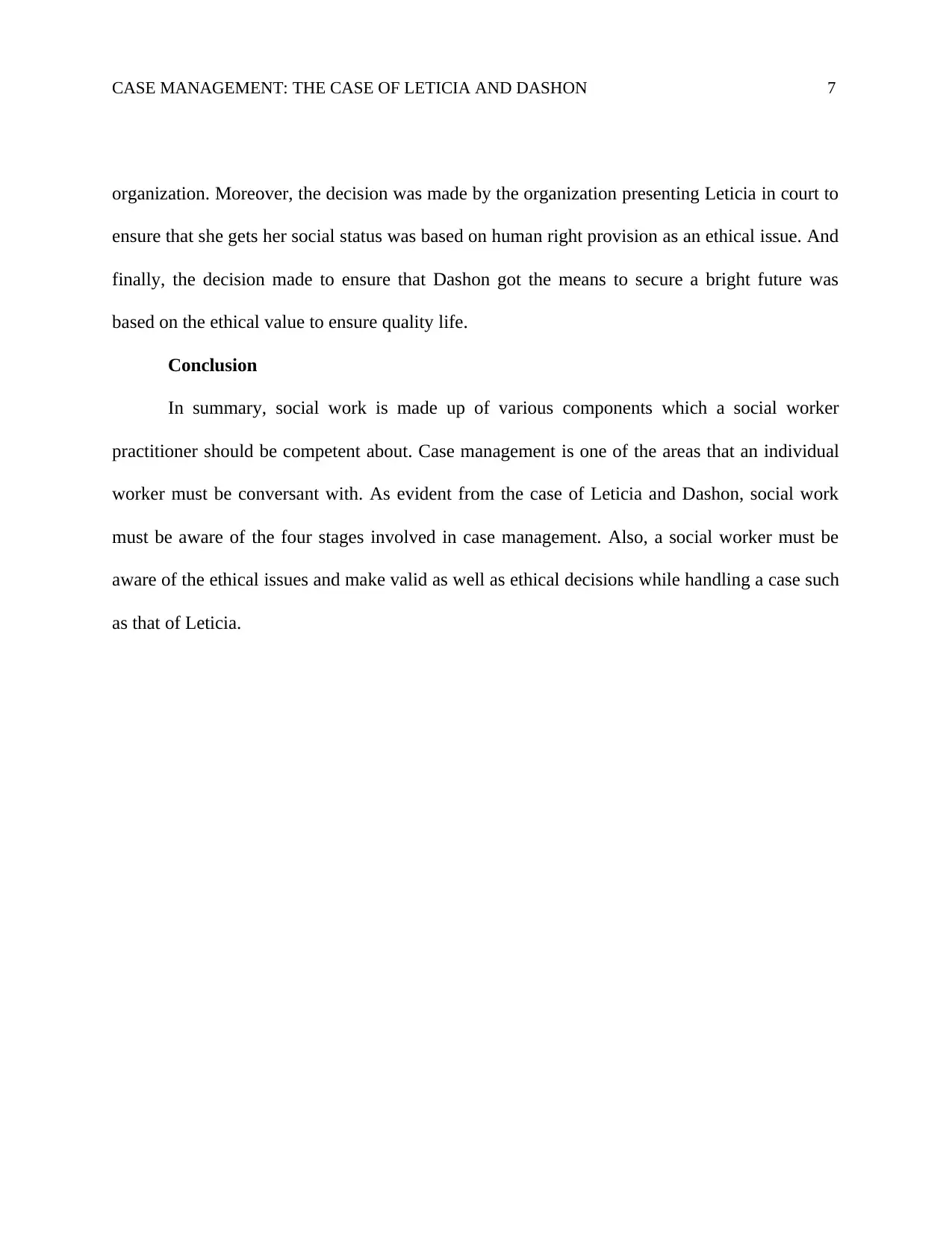
CASE MANAGEMENT: THE CASE OF LETICIA AND DASHON 7
organization. Moreover, the decision was made by the organization presenting Leticia in court to
ensure that she gets her social status was based on human right provision as an ethical issue. And
finally, the decision made to ensure that Dashon got the means to secure a bright future was
based on the ethical value to ensure quality life.
Conclusion
In summary, social work is made up of various components which a social worker
practitioner should be competent about. Case management is one of the areas that an individual
worker must be conversant with. As evident from the case of Leticia and Dashon, social work
must be aware of the four stages involved in case management. Also, a social worker must be
aware of the ethical issues and make valid as well as ethical decisions while handling a case such
as that of Leticia.
organization. Moreover, the decision was made by the organization presenting Leticia in court to
ensure that she gets her social status was based on human right provision as an ethical issue. And
finally, the decision made to ensure that Dashon got the means to secure a bright future was
based on the ethical value to ensure quality life.
Conclusion
In summary, social work is made up of various components which a social worker
practitioner should be competent about. Case management is one of the areas that an individual
worker must be conversant with. As evident from the case of Leticia and Dashon, social work
must be aware of the four stages involved in case management. Also, a social worker must be
aware of the ethical issues and make valid as well as ethical decisions while handling a case such
as that of Leticia.
Paraphrase This Document
Need a fresh take? Get an instant paraphrase of this document with our AI Paraphraser
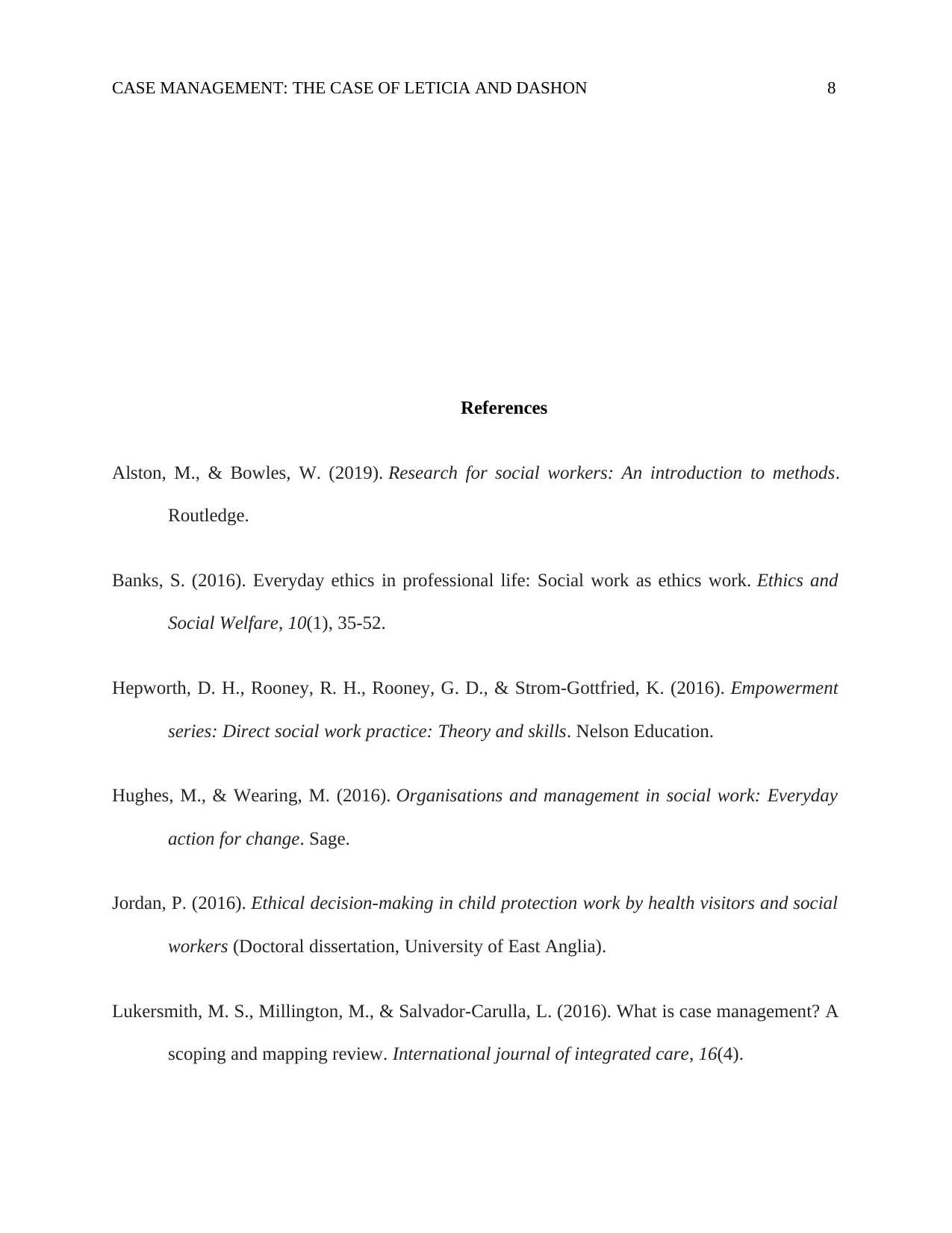
CASE MANAGEMENT: THE CASE OF LETICIA AND DASHON 8
References
Alston, M., & Bowles, W. (2019). Research for social workers: An introduction to methods.
Routledge.
Banks, S. (2016). Everyday ethics in professional life: Social work as ethics work. Ethics and
Social Welfare, 10(1), 35-52.
Hepworth, D. H., Rooney, R. H., Rooney, G. D., & Strom-Gottfried, K. (2016). Empowerment
series: Direct social work practice: Theory and skills. Nelson Education.
Hughes, M., & Wearing, M. (2016). Organisations and management in social work: Everyday
action for change. Sage.
Jordan, P. (2016). Ethical decision-making in child protection work by health visitors and social
workers (Doctoral dissertation, University of East Anglia).
Lukersmith, M. S., Millington, M., & Salvador-Carulla, L. (2016). What is case management? A
scoping and mapping review. International journal of integrated care, 16(4).
References
Alston, M., & Bowles, W. (2019). Research for social workers: An introduction to methods.
Routledge.
Banks, S. (2016). Everyday ethics in professional life: Social work as ethics work. Ethics and
Social Welfare, 10(1), 35-52.
Hepworth, D. H., Rooney, R. H., Rooney, G. D., & Strom-Gottfried, K. (2016). Empowerment
series: Direct social work practice: Theory and skills. Nelson Education.
Hughes, M., & Wearing, M. (2016). Organisations and management in social work: Everyday
action for change. Sage.
Jordan, P. (2016). Ethical decision-making in child protection work by health visitors and social
workers (Doctoral dissertation, University of East Anglia).
Lukersmith, M. S., Millington, M., & Salvador-Carulla, L. (2016). What is case management? A
scoping and mapping review. International journal of integrated care, 16(4).
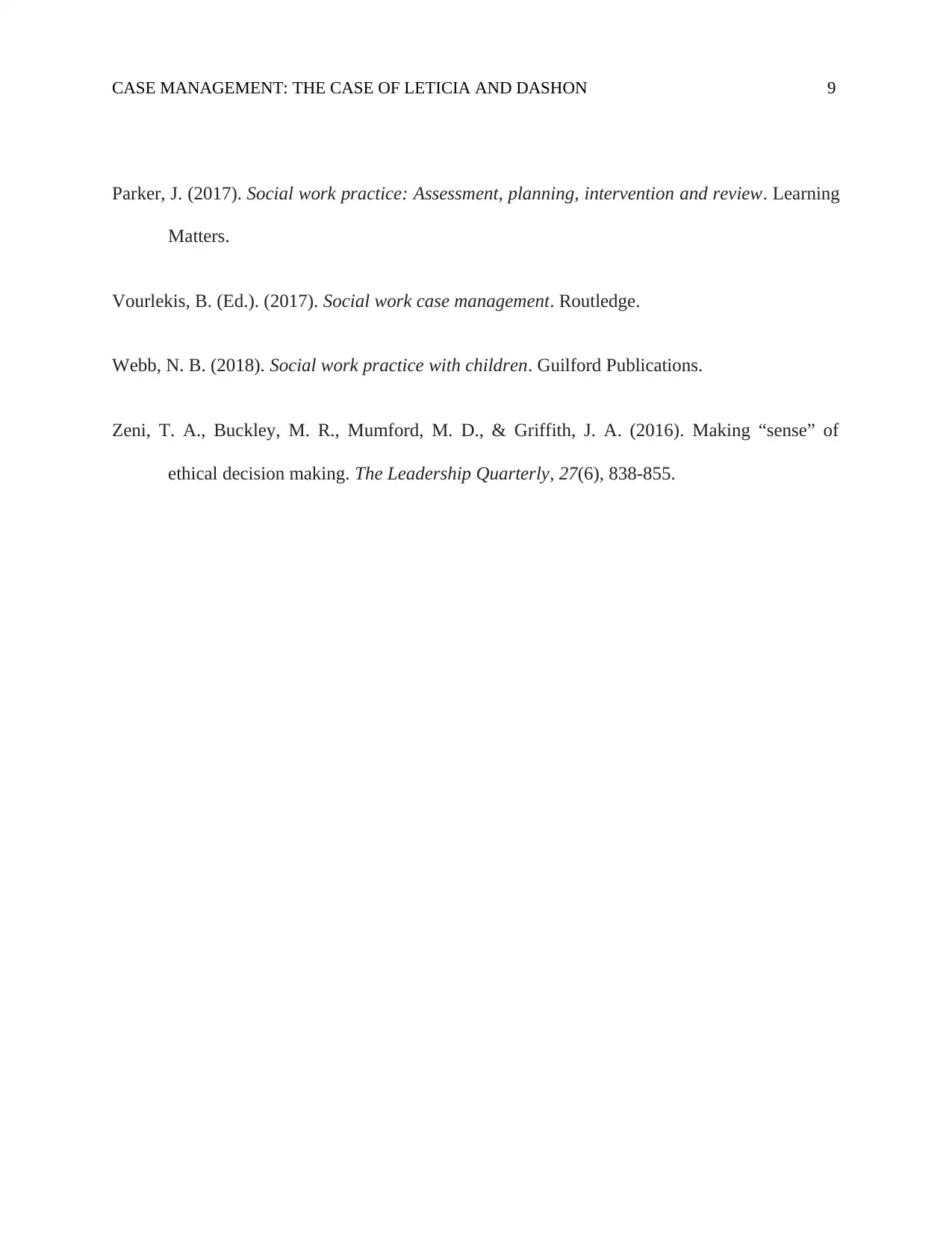
CASE MANAGEMENT: THE CASE OF LETICIA AND DASHON 9
Parker, J. (2017). Social work practice: Assessment, planning, intervention and review. Learning
Matters.
Vourlekis, B. (Ed.). (2017). Social work case management. Routledge.
Webb, N. B. (2018). Social work practice with children. Guilford Publications.
Zeni, T. A., Buckley, M. R., Mumford, M. D., & Griffith, J. A. (2016). Making “sense” of
ethical decision making. The Leadership Quarterly, 27(6), 838-855.
Parker, J. (2017). Social work practice: Assessment, planning, intervention and review. Learning
Matters.
Vourlekis, B. (Ed.). (2017). Social work case management. Routledge.
Webb, N. B. (2018). Social work practice with children. Guilford Publications.
Zeni, T. A., Buckley, M. R., Mumford, M. D., & Griffith, J. A. (2016). Making “sense” of
ethical decision making. The Leadership Quarterly, 27(6), 838-855.
⊘ This is a preview!⊘
Do you want full access?
Subscribe today to unlock all pages.

Trusted by 1+ million students worldwide
1 out of 9
Related Documents
Your All-in-One AI-Powered Toolkit for Academic Success.
+13062052269
info@desklib.com
Available 24*7 on WhatsApp / Email
![[object Object]](/_next/static/media/star-bottom.7253800d.svg)
Unlock your academic potential
Copyright © 2020–2025 A2Z Services. All Rights Reserved. Developed and managed by ZUCOL.





